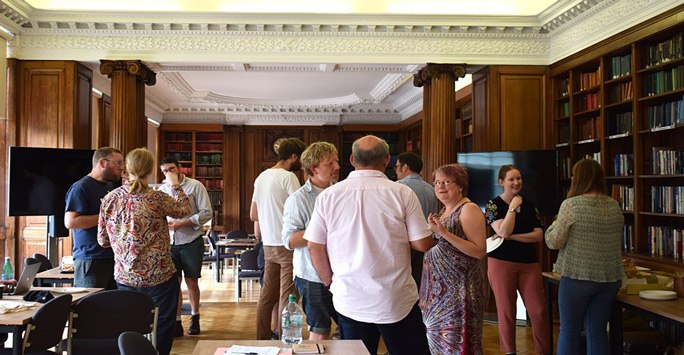The Human Remains Collaboratory is now LIVE! If you would like to learn more or be added to the network list, please contact to find out how you can take part. Keep an eye on this page for all future events, resources, training opportunities, and publications produced by the network.
Following the success of the Problematic Bodies Conference (5 – 7 September 2023), The Human Remains Project’s first multi-disciplinary hybrid event, we are pleased to announce that the network is officially live and active.
Problematic Bodies was the first event of its kind to bring this network together both in-person and online and encourage individuals from across the UK and internationally to share their experiences and knowledge as a collective. It became apparent during the event just how important this network will be as an open forum for people, from a wide variety of disciplines and backgrounds, who interact and engage with human remains and want to make a positive change as well as interact with others across the network.
The network aims to involve research projects, scholars, students, church stakeholders, local interest groups, local history/archaeology societies, archaeology units, professional exhumation services, and any other relevant individuals or groups.
The purpose of the network is to inform, research, and impact policy, planning and guidance for handling the historic dead in Britain, beginning with Christian contexts, and eventually expanding to the long-dead from other periods, places and contexts. The Human Remains Digital Library aims to expand the methodology focussed on identifying what constitutes ‘respectful’ treatment of human remains to include the ‘value’ of different types of human remains (e.g. disarticulated, cremated, fragmentary) and the ‘respect/value’ afforded different identities (gendered, religious, age-related etc.) over time. The network aims to feed this into recommendations for guidance and policy (re-)design for human remains and for those who encounter them in their field of work or study.
Members of The Human Remains Collaboratory can keep abreast of new research, curate public interest, and collaborate on new lines of enquiry generated by the project’s digital library. By supporting local interest groups co-creating data, it will reinvigorate religious archive use while expanding local histories, create exhibitions, increase public interest and education, and underline a church’s contribution to Britain’s prominence in mortuary investigation and science.
Current Members of the Human Remains Collaboratory:
Dr Ruth Nugent – UKRI Future Leader’s Fellow and Principle Investigator for The Human Remains Project – University of Liverpool
Dr Glenn Cahilly-Bretzin – Medieval Research Assistant for The Human Remains Project – University of Liverpool
Thomas Fitzgerald – PhD Student (postmedieval charnelling in England) attached to The Human Remains Project – University of Liverpool
Dr James Butler – Digital Humanities Postdoctoral Research Assistant for The Human Remains Project – University of Liverpool
Katherine Foster – Project Administrator for The Human Remains Project – University of Liverpool
Dr Isabelle Gribomont – Digital Humanities (previous postdoctoral research assistant on The Human Remains project) - University of Louvain
Professor Sarah Tarlow – postmedieval mortuary practices and member of the Ethical Entanglements Project - University of Leicester
Dr Melanie Giles – European Prehistory - University of Manchester
Dr Kate Giles – Buildings Archaeologist - University of York
Dr Louise Hampson – Head of Heritage Partnerships for the Centre for the Study of Christianity and Culture - University of York
Professor Philip Schwyzer – Early Modern/Renaissance English Literature - University of Exeter
Dr Brian Costello – Medieval Archaeology - University of Leicester
Dr John Jenkins – Assistant Director for the Centre of Pilgrimage Studies - University of York
Dr Alexandra Claridge –Medieval Royal Historian - University of Liverpool
Dr Richard Bellis – History of postmedieval Medicine - University of Liverpool
Professor Liv Nilsson Stutz – Burial Archaeologist and Leader of the Ethical Entanglements Project - Linnaeus University (Sweden)
Dr Peta Bulmer – Burial Archaeologist - University of Liverpool
Professor Tim Grady – Military Historian (World Wars I and II) - University of Chester
Mathew Morris – Field Archaeologist - University of Leicester and Leicester Cathedral archaeologist
Dr Trish Biers – Osteologist and Paleopathologist - University of Cambridge
Professor Nicole Marafioti – Medieval and Renaissance Studies - Trinity University (USA)
Dr Michael Penman – Medieval Scottish History - University of Stirling
Ian Blaney – Ecclesiastical / Burial and Cremation Law - Lee Bolton Monier-Williams
Dr Helen Frisby – Historian of Nineteenth Century Death, Dying and Funerals - University of Bath
Dr Eleanor Williams – Archaeologist and Osteologist and member of the Finding Eanswythe Project - Canterbury Christ Church University
Dr Anna Duch – Medieval Royals - Colombia State Community College (USA)
Dr Adam Daubney – Archaeological Finds Specialist - Freelance / British Museum’s Portable Antiquities Scheme
Tom Livingstone – Heritage Stonemason
Dr Kirsty Owen – Deputy Head of Archaeology - Historic Environment Scotland
Dr Austin Mason – History / Digital Humanities - Carleton College (USA)
Alfred Hawkins – Assistant Curator at Tower of London - Historic Royal Palaces
Dr Kirsty Squires – Bioarchaeologist - Staffordshire University
John Lawson – Archaeologist – City of Edinburgh Council
Dame Sue Black – Forensic Anthropologist – University of Oxford
Dr Ulla Moilanen – Medieval and Post-Medieval Burial Customs and Mortuary Culture - University of Turku (Finland)
Dr Marianne Hem Eriksen – Viking Age Archaeologist and leader of the Body-Politics Project - University of Leicester
Dr Rosann Gage – Medieval Literature - Kent State University (USA)
Professor Anthony Sinclair – Archaeologist (theory and method) - University of Liverpool
Dr Patrick Randolph-Quinney – Biological and Forensic Anthropologist - Northumbria University
Rachael Wragg – Heritage Stonemason - Lincoln Cathedral
Julie Dunk – Chief Executive – Institute of Cemetery and Crematorium Management (ICCM)
Dr Noël James – Director & CEO of Milton Keynes City Discovery Centre (MKCDC) – Bradwell Abbey
